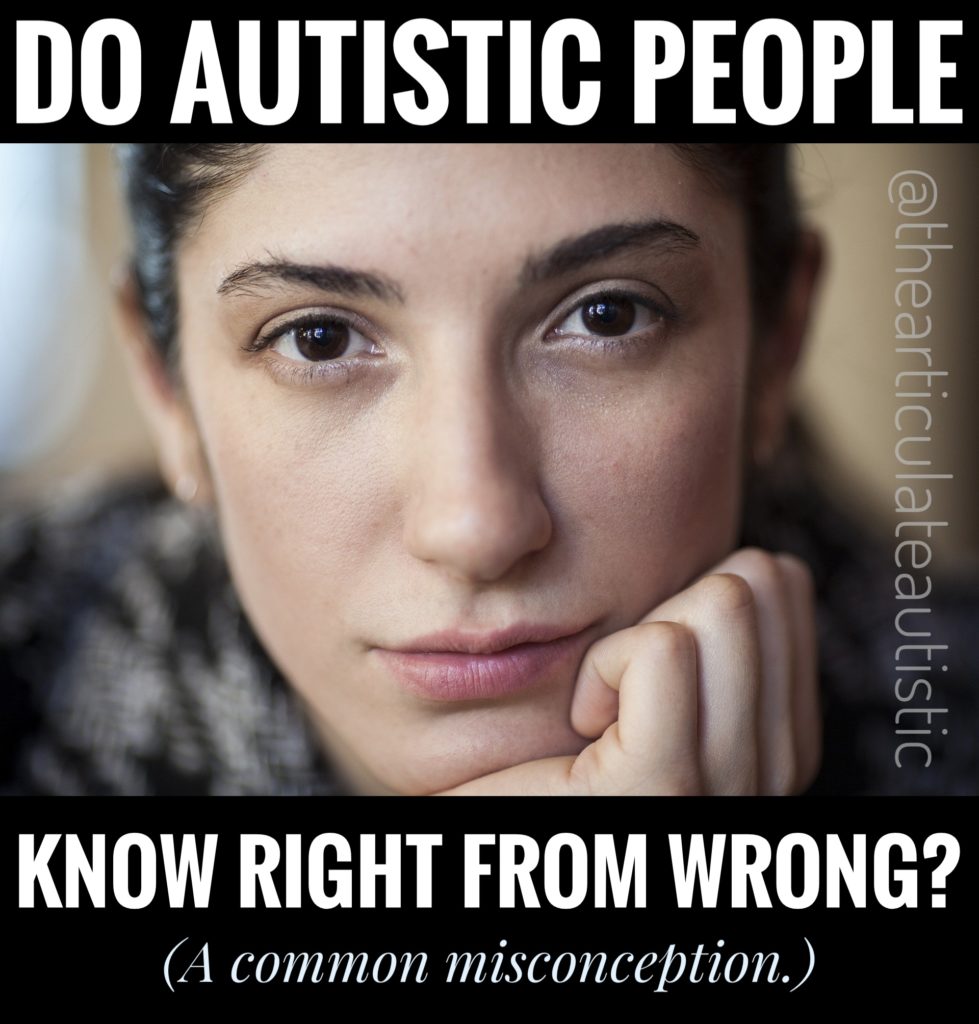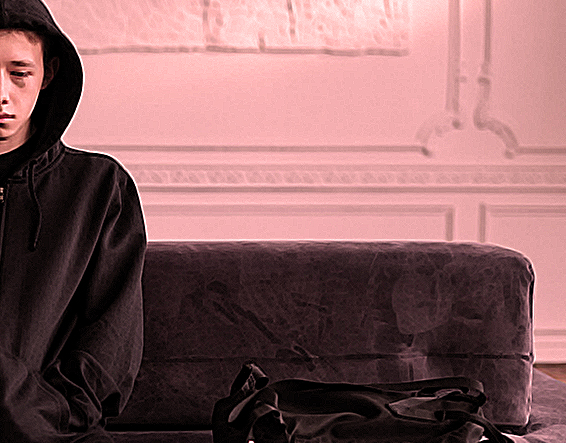“So, You Don’t Know Right From Wrong?” – A Common Misconception About Social vs Moral Awareness Among Autistic People

“So, does this mean you don’t know right from wrong?”
This is something an ex of mine asked me a long time ago, and it has stuck with me for many years. At the time, I was trying to explain how I didn’t know when I did things wrong, and this was their response.
Back then, I didn’t understand that there was a difference between doing something socially wrong and doing something morally wrong, so I answered “Yes” to this query.
But, for me, the “Yes” meant “I don’t know when I have done or said something in the context of social interaction that was considered “wrong” by neurotypical standards.”
I did, however, know right from wrong morally, but I never really understood the distinction between the two until recently. Well, I actually did understand the distinction, but I didn’t have the words to explain it.
And now that I do, I understand that the difference between them is night and day.
Not knowing that it’s “wrong” to laugh at a funeral versus not knowing it’s wrong to murder a person are two totally and completely different things (and should be treated as such).
To get a better understanding of this concept, let’s look at the word “wrong” for a minute. This word is used to describe everything from making a simple mistake (walking into the wrong classroom at school) to committing a horrible crime (that results in the wrongful death of a person).
In the first example, the “wrong” that has been committed is only slightly embarrassing. Nobody gets hurt, and everybody forgets about it in an hour. In the second, however, somebody is dead. Two totally different concepts, same word used to describe them.
Most Autistic People Are Highly Morally Aware
Most autistic people not only know right from wrong morally, we are also highly morally conscious people. Many of us are social justice warriors who care deeply about humanity, animals, the planet, and every living thing. We also strongly believe in and strive for balance and fairness.
Furthermore, we are quite rule-bound. Once we learn a rule (and its reasoning—that’s very important), whether social, moral, or otherwise, we adhere to that rule. It becomes a part of our mental map, and the thought of breaking or even bending what has become a rule makes many of us feel physically ill, anxious, or both.
That’s why lying is not easy for us nor does it come naturally. Can we lie and make things up? Sure, some of us can. But, for us, doing so comes with a lot more emotional fall-out than it seems to for the average neurotypical person.
Man’s Law or God’s Law?
My mother introduced me to this concept a few years ago, and I can’t think of a better way to describe how I feel about the difference between what is considered socially wrong and what is considered morally wrong.
Even if you’re not a religious person, you might appreciate this concept, and you may have a better understanding of either yourself or your autistic loved one if you apply it to conversations you’ve had in the past.
The way I understand the concept is this:
“Man’s law” is how human beings have decided to conduct themselves in everyday life. For example, complex social behaviors and rules that govern those behaviors. If someone makes what is considered a social mistake by circumventing these rules (again, invented and implemented by human beings), there are feelings of embarrassment for the person and social pressure to fall back in line, as it were, and continue to act per the social rules laid out by whatever society they’re in.
“God’s law” is how human beings are guided internally. Call it God, intuition, having a conscience, empathy, etc., it’s that feeling in the pit of your stomach when you know you are about to do something morally questionable or you’re watching someone else do it.
Unlike “Man’s law”, when “God’s law” is broken, it can cause a type of harm and damage that affects the fabric of humanity itself, not just its social structure.
Here’s Where Autistic and Neurotypical People Strongly Divide
I’ve said this many times before, if given the choice between doing the socially acceptable thing and the morally right thing, I will always choose the morally right thing (even if it goes against what is socially acceptable).
Now, before I continue with this line of thinking, let me be clear, I am not saying that autistic people are more moral than neurotypical people or that neurotypical people don’t have morals or have fewer morals. We just process and move through the world differently.
However, this is one of the stronger disconnects I’ve seen among the neurotypes.
What do I mean?
Well, think of it this way:
How many times have you heard or read a news story where somebody committed a crime but they were allowed to continue because to try to expose them would destroy the whistleblower’s social reputation? How many times have you heard, “Well, I thought something was up with that person, but I didn’t want to get involved”?
Most autistic people do not care if something they do or say to expose something morally wrong will cost them their reputation or social status. That means nothing to most of us. Nothing. What comes first, and what will always come first is “God’s law”, or, doing the right thing and keeping the world in balance.
“God’s law” is the hill we will die on again and again and again.
Also, and this is important for both neurotypes to consider in order to facilitate better communication between us:
In neurotypical society, social correctness and moral goodness are seen as interconnected. For instance, if someone speaks and acts in a manner that is socially acceptable and similar to those they live in community with, they are often seen as and treated as “good people”. However, if someone speaks and acts in a manner that is incongruent to the people they live in community with, they will often be seen as and treated as “bad people”.
This doesn’t appear to be the case among autistic people.
Why Neurotypical Social Rules Appear So Unimportant to Autistics
If you’ve ever heard the autistic person in your life tell you that neurotypical social rules are “stupid” or “ridiculous”, you were likely and understandably offended.
But here’s the thing (and this may sound offensive in and of itself, and for that, I apologize): We have more important things to worry about. Again, we are much more geared towards social justice, fairness, balance, the planet, etc.
While maintaining the status quo and following complex social rules is as important and inherent as breathing for neurotypical people, it is not so for autistic people.
To put it a different way, eye contact, volume of voice, tone of voice, and appropriate time and place to say or do a thing is very low on the list of priorities for an autistic person as, say, COVID-19, Black Lives Matter, and climate change.
Let me give you an analogy out of one of those examples:
Elizabeth is 15 years old, autistic, and she’s on her computer researching the effect climate change is having on the planet. This is her main priority in life, and she watches videos, takes notes, and reads all she can on the subject for hours a day.
When her neurotypical uncle, Ralph, in his thirties, comes for a visit, Elizabeth’s father tells her she has to chat with him for at least an hour.
Elizabeth’s anxiety ratchets up, but she tears herself away from trying to save the planet to chat with her uncle as instructed. In the first five minutes of his arrival, however, he brings in a huge bag filled with junk that he’s cleaned out of his car, 90 percent of it being bottles and cardboard, and he simply throws it away in the trashcan by the side of the house instead of the recycling bin (which is right next to it).
Elizabeth, who is very environmentally conscious, is in shock at his behavior and launches into an impassioned speech about why it’s so important for Uncle Ralph to recycle what he can.
This means nothing to him, so he completely dismisses her concerns. Elizabeth yells at Uncle Ralph and storms off to her room, eager to get back to what she was doing.
Later on, after Uncle Ralph leaves, Elizabeth’s father spends the better part of an hour telling his daughter that she shouldn’t try to force her beliefs on other people AND she should respect her elders.
This makes absolutely no sense to Elizabeth because climate change isn’t a belief, it’s a verifiable scientific fact she’s been researching carefully for months. Also, what does age have to do with anything?
For Elizabeth, this denial of a very real and quantifiable problem makes about as much sense as people randomly stepping into traffic, but yet, she’s not supposed to say anything about it?

From what the neurotypical people around her are telling her, it’s much more important to maintain the status quo and not say anything that could be considered offensive to someone’s belief system or considered disrespectful to someone based on their social status (“Man’s law) even if that means it could be incredibly detrimental to human life in the long run (“God’s law).
To Elizabeth (and a large majority of autistics) this line of thinking simply makes no sense.
It’s Not Wrong to Be Different, But It Is Wrong to Try to Harm Someone for Being Different
Let’s put “Man’s law” and “God’s law” together now. Being different isn’t inherently wrong. Seeing and processing the world differently is not morally wrong.
It may be unsettling to people who don’t understand why this particular person isn’t obeying what they believe to be hard and fast social rules, but the behavior of this different person is not breaking any laws whatsoever. It’s not harming anyone, not even the person engaging in said behaviors.
What is harmful, however, is when someone who sees these behaviors and becomes unsettled by them, actively makes fun of, shames, bullies, and/or abuses the person for being simply being themselves.
I think most of us would agree, regardless of neurotype, that beating up a kid walking home from school because he speaks or moves his body in an atypical way is wrong, morally, ethically, and even legally.
When Autistic People Don’t Follow Man’s Law, God’s Law Is Broken
If “Man’s law” is social rules created by human beings, and “God’s law” depicts what is morally right and wrong, then what should take priority? If you were to ask people on the street (again, regardless of neurotype) most would confidently tell you that God’s law is the most important and should always rank above arbitrary social rules invented by flawed human beings.
But that often isn’t what ends up happening. And, what’s most ironic, in my opinion, is that when autistic people don’t appear to follow neurotypical social norms, they often become the targets of abuse.
This means, whether we are aware of it or not, social rules and status quo often take a much higher priority in neurotypical society than standing up for and maintaining moral values.
After all, in modern society, the punishment for breaking a social rule is often much more severe than breaking a moral one.
Let’s look at an example that illustrates this:
Johnny, 18, autistic. Terry, 18, neurotypical. Roger, 19, neurotypical.
Johnny is walking home from school while listening to his headphones and stimming along to his music. A couple of guys (Terry and Roger) who have a problem with Johnny and his behavior see this and start following him.
They wait until he’s on a side street, jump him, and beat him up to the point where he can’t get up or see out of his left eye. In the minds of these two bullies, Johnny has broken social rules and that made them very uncomfortable and angry, and he has been severely punished for these “transgressions”.

Unlike Roger, Terry actually felt terrible about beating up Johnny, and he didn’t want to go through with it. However, he was afraid to speak up because this could have potentially decreased his social standing in Roger’s eyes and also make him a target for bullying in the future.
So, he went along with the beating, even though, in his gut, Terry knew what he was doing was wrong.
And, even though they beat him terribly, Terry and Roger weren’t suspended from school or given any punishment because the incident didn’t happen on school grounds.
Like I said, in modern society, the punishment for breaking a social rule is often much more severe than breaking a moral one.
Wouldn’t you agree?
The Takeaway
Autistic people show empathy, love, and concern in different ways than neurotypical people do. Because of our tendency to not prioritize neurotypical social rules (and often break them due to lack of understanding) many neurotypical people assume that autistic people do not know right from wrong when nothing could be further from the truth.
Most of us DO know right from wrong when it comes to morals and ethics, we just may not understand how we are expected to behave in social situations where neurotypical people are the majority.
So, if your autistic loved one scoffs at neurotypical social rules but they are quick to help others, rest assured, not only do they know right from wrong, they know it where it counts the most.
Want downloadable, PDF-format copies of these blog posts to print and use with your loved ones or small class? Click here to become a Patreon supporter!





1 Response
[…] “So, You Don’t Know Right From Wrong?” – A Common Misconception About Social vs Mora… […]